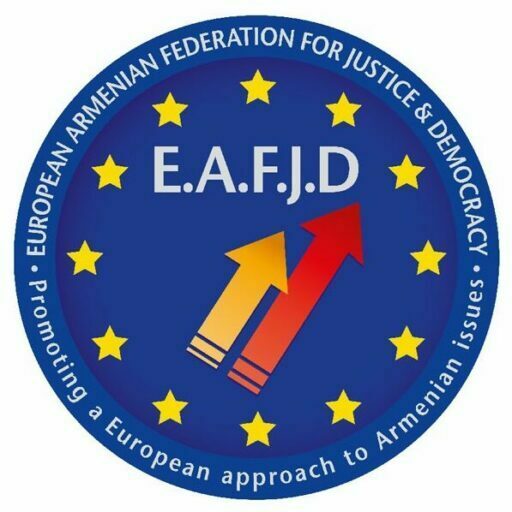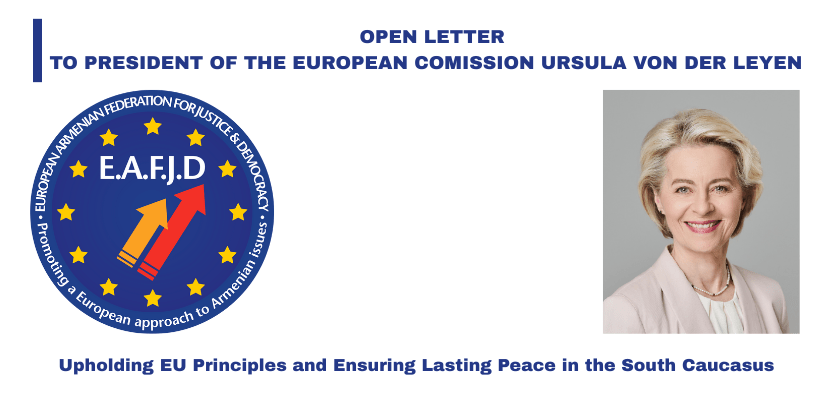Dear President von der Leyen,
I am writing to you today with a deep sense of urgency regarding the European Union’s role in the South Caucasus, particularly considering the recently signed preliminary peace agreement between Armenia and Azerbaijan.
While the pursuit of peace is paramount, the details within this preliminary agreement already present serious issues that risk plunging the region into further turmoil, some directly related to the purview of the European Union. The published agreement is riddled with contradictions and heavy burdens on Armenia, as a result of which the settlement is less likely to promote peace and more likely to impose unilateral concessions on the Armenian people.
While the agreement stresses the importance of respect for territorial integrity and sovereignty, it makes no mention of the presence of Azerbaijan’s military on Armenian soil and provides no framework or timeline for their withdrawal. Moreover, the opening of a corridor, as President Trump called it, in the southern Armenian region of Syunik to provide “unimpeded connectivity” from Azerbaijan to its enclave of Nakhichevan is a direct threat to the supposed respect of Armenia’s territorial integrity that is stipulated in the deal.
Crucially, the agreement also mentions that both countries cannot interfere in the internal affairs of one another. Yet, as is evident by multiple speeches and statements by Azerbaijan’s President Aliyev, before and after the announcement of the signing of the initial agreement, Azerbaijan preconditions reconciliation with demanding constitutional change in Armenia. The agreement makes no mention on the fate and rights of the ethnically cleansed Armenians of Nagorno-Karabakh or the release of the Armenian hostages facing trials in Baku, two crucial conditions that would solidify a just and sincere path towards peace, notion that has been expressed multiple times by the European Parliament.
It is imperative to ensure that a diplomatic settlement does not come at the expense of justice, accountability, and the EU’s foundational principles. The European Union must not be passively drawn into a narrative of peace “at all costs” that overlooks the critical need to address past and ongoing human rights violations.
The recent U.S.-brokered agreement, while a step towards normalization, contains provisions that pose a direct threat to the EU’s established role in the region. Specifically, Article 7 of the draft peace agreement calls for the cessation of all third-party missions, a clause that directly targets the monitoring activities of the European Union’s Mission in Armenia (EUMA). Despite the EU Council’s decision to extend EUMA’s mandate until February 2027, the mission’s very existence is now under threat. Azerbaijan’s official commentary argues that EUMA is no longer relevant, but this position must be firmly rejected. EUMA is an essential, unarmed civilian mission that provides crucial, impartial observation and reporting on the volatile border. Its presence is not a provocation; it is a stabilizing force and a testament to the EU’s commitment to human security. Its continuation is non-negotiable for anyone who genuinely desires a secure and stable peace.
Furthermore, the integrity of a lasting peace is fundamentally tied to justice and accountability. Article 15 of the new agreement, which calls for the withdrawal of ongoing legal cases, is concerning. This provision, if upheld, would effectively negate the pursuit of justice for victims of war crimes and other human rights abuses, cases that have found international backing in the European Court for Human Rights. It would allow those responsible for the ethnic cleansing of over 120,000 ethnic Armenians from Nagorno-Karabakh to evade responsibility. The continued detention of Armenian prisoners of war and the documented destruction of Armenian cultural heritage further underscores the need for a robust accountability framework, not a clause that absolves perpetrators.
It is not worthy that the European Parliament has consistently and specifically tied resolution of the conflict and reconciliation with calling for the release of the Armenian hostages held in Baku and defending the rights of the collective return of the Armenian population of Nagorno Karabakh to their homeland under international protection guarantees. This principled stance was recently re-affirmed; On August 11, a joint statement was issued by leading members of the European Parliament, MEP David McAllister, the Chair of the Committee on Foreign Affairs (AFET), MEP Sergey Lagodinsky, Chair of the Delegation to the Euronest Parliamentary Assembly, MEP Nils Ušakovs, the Chair of the Delegation for relations with the South Caucasus, MEP Miriam Lexmann, the AFET Standing Rapporteur on Armenia and MEP Dan Barna, the AFET Standing Rapporteur on Azerbaijan. In this announcement, they specifically called for the full withdrawal of Azerbaijani forces from the territory of the Republic of Armenia in the near future. They also noted the urgent need to “resolve the outstanding issues of Armenian prisoners in Azerbaijan and displaced Karabakh Armenians”.
The EU’s credibility as a global human rights advocate requires its full attention on these injustices. We must insist on the release of all prisoners and the right of return for the forcefully deported ethnic Armenians of Nagorno-Karabakh. The EU has an opportunity to demonstrate its geopolitical standing and moral authority. We cannot allow ourselves to be sidelined by a deal that appears to prioritize expediency over principle.
I urge you, Madame President, as a representative of Europeans of Armenian origin to use your power to ensure that the EU’s engagement in the South Caucasus remains strong. The EU must use its diplomatic and economic leverage to protect EUMA, demand accountability for human rights violations, and refuse to accept a unilateral settlement which will worsen the situation in the region.
Best Regards,
Kaspar Karampetian
President


